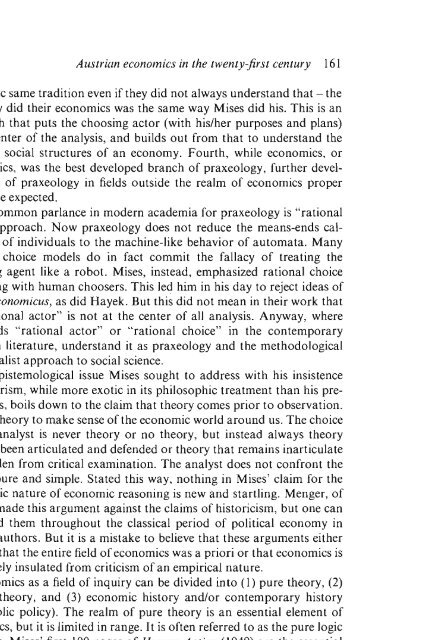Handbook on Contemporary Austrian Economics
Handbook on Contemporary Austrian Economics
Handbook on Contemporary Austrian Economics
Create successful ePaper yourself
Turn your PDF publications into a flip-book with our unique Google optimized e-Paper software.
<strong>Austrian</strong> ec<strong>on</strong>omics in the twenty-first century 161<br />
that basic same traditi<strong>on</strong> even if they did not always understand that - the<br />
way they did their ec<strong>on</strong>omics was the same way Mises did his. This is an<br />
approach that puts the choosing actor (with his/her purposes and plans)<br />
at the center of the analysis, and builds out from that to understand the<br />
complex social structures of an ec<strong>on</strong>omy. Fourth, while ec<strong>on</strong>omics, or<br />
catallactics, was the best developed branch of praxeology, further developments<br />
of praxeology in fields outside the realm of ec<strong>on</strong>omics proper<br />
should be expected.<br />
The comm<strong>on</strong> parlance in modem academia for praxeology is "rati<strong>on</strong>al<br />
actor" approach. Now praxeology does not reduce the means-ends calculati<strong>on</strong><br />
of individuals to the machine-like behavior of automata. Many<br />
rati<strong>on</strong>al choice models do in fact commit the fallacy of treating the<br />
choosing agent like a robot. Mises, instead, emphasized rati<strong>on</strong>al choice<br />
theorizing with human choosers. This led him in his day to reject ideas of<br />
Homo ec<strong>on</strong>omicus, as did Hayek. But this did not mean in their work that<br />
the "rati<strong>on</strong>al actor" is not at the center of all analysis. Anyway, where<br />
<strong>on</strong>e reads "rati<strong>on</strong>al actor" or "rati<strong>on</strong>al choice" in the c<strong>on</strong>temporary<br />
<strong>Austrian</strong> literature, understand it as praxeology and the methodological<br />
individualist approach to social science.<br />
The epistemological issue Mises sought to address with his insistence<br />
<strong>on</strong> apriorism, while more exotic in its philosophic treatment than his predecessors,<br />
boils down to the claim that theory comes prior to observati<strong>on</strong>.<br />
We use theory to make sense of the ec<strong>on</strong>omic world around us. The choice<br />
for the analyst is never theory or no theory, but instead always theory<br />
that has been articulated and defended or theory that remains inarticulate<br />
and hidden from critical examinati<strong>on</strong>. The analyst does not c<strong>on</strong>fr<strong>on</strong>t the<br />
"data" pure and simple. Stated this way, nothing in Mises' claim for the<br />
aprioristic nature of ec<strong>on</strong>omic reas<strong>on</strong>ing is new and startling. Menger, of<br />
course, made this argument against the claims of historicism, but <strong>on</strong>e can<br />
also read them throughout the classical period of political ec<strong>on</strong>omy in<br />
various authors. But it is a mistake to believe that these arguments either<br />
claimed that the entire field of ec<strong>on</strong>omics was a priori or that ec<strong>on</strong>omics is<br />
completely insulated from criticism of an empirical nature.<br />
Ec<strong>on</strong>omics as a field of inquiry can be divided into (1) pure theory, (2)<br />
applied theory, and (3) ec<strong>on</strong>omic history and/or c<strong>on</strong>temporary history<br />
(i.e. , public policy). The realm of pure theory is an essential element of<br />
ec<strong>on</strong>omics, but it is limited in range. It is often referred to as the pure logic<br />
of choice. Mises' first 100 pages of Human Acti<strong>on</strong> (1949) are the essential<br />
reading <strong>on</strong> this point for <strong>Austrian</strong>s, but <strong>on</strong>e can also get systematic statements<br />
of this positi<strong>on</strong> in Menger, B6hm-Bawerk, and of course Mises'<br />
Epistemological Problems ([1933] 1960).4 Li<strong>on</strong>el Robbins' Nature and<br />
Significance of Ec<strong>on</strong>omic Science (1932) could also be usefully c<strong>on</strong>sulted,

















